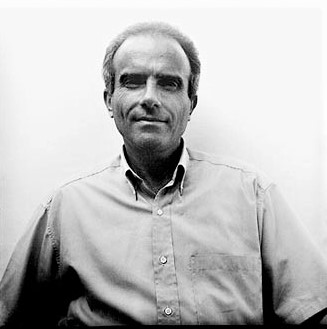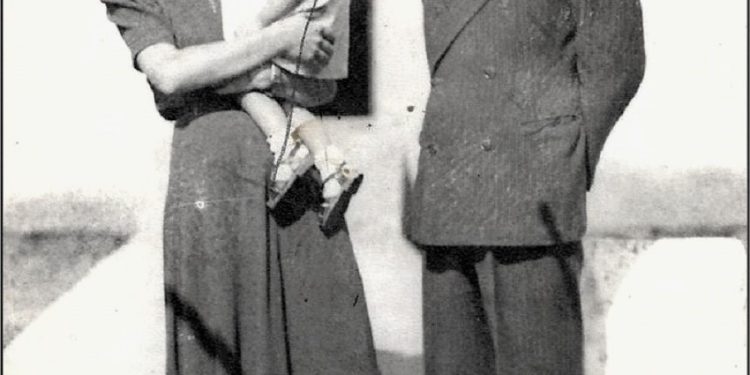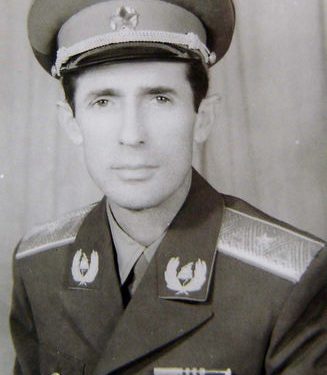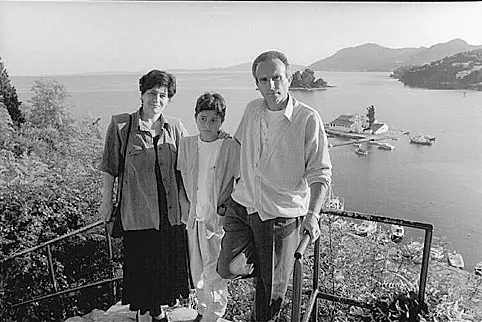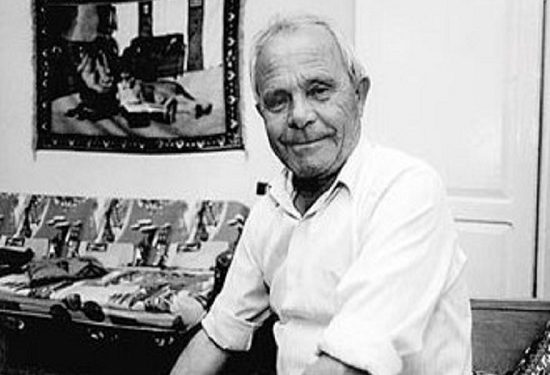From Thanas Gjika
The third part
– Portrait-biography dedicated to Dino Thanas Martiko-
Memorie.al / During the national history of the Albanian people, many men and women have stood out for the courage with which they opposed the injustices and unjust orders of foreign or local rulers. This phenomenon has been widespread for centuries, but also during the years 1944-1991, when the communist dictatorship ruled. However, the terror policy and propaganda of the party-state forced the people to value servility towards the party and power as bravery. The courageous stances of those who opposed the Party’s policy, or the wrong actions of the Party cadres and the government, were punished with imprisonment, exile, shootings, etc.
Continues from last issue
“You cannot rise above the Party”! The boss boasted back.
Then Dinua burst out: “I understand that you do everything with excessive zeal. You are more Catholic than the Pope. You will cover your past, when you were a spy for the Italians”. There was deep silence in the hall. The first secretary of the district and the chairman of the Executive Committee did not like themselves.
They didn’t know how to react. They were usually reserved to clash with Dino. They knew his honesty, his manly character and the stubbornness with which he defended his opinions. When he spoke his mind, he didn’t back down. They didn’t want him to repeat his statement: “A man, especially a communist, should never gain his happiness at the expense of others.”
That night’s meeting ended without a decision, but the following meeting was organized to punish Dino with leaving the party. Dinua did not experience it as a severe punishment, and even felt relieved. Often times, he had felt uncomfortable in that environment with ignorant, servile people, blind tools of the dictatorship and spies.
The feeling of being free, the desire to remain honest, noble, brave, heroic, was greater than the desire for a career. The motivation for expulsion from the Party: “You have no hatred for the rich classes”, was a true feeling of his. The way was opened for the Head of the Branch to begin the first mass arrests in the villages of the Coast. In Shënvasi, nine villagers were arrested and the same number in Nivicë.
The class war, in fact, was the peacetime continuation of the fratricidal war, which had started from the KPS during the war with the declaration of the ‘National Front’, a “traitorous organization”, at a time when the Ballist forces were fighting in cooperation with partisan forces. At the time of the war, this maneuver was done with the aim that the PKS, at the end of the war, would have no rivals, to take political and economic power as a single force. After the War, this same party developed the policy of class war, to keep the power it took back as the sole force.
Thus, during the Anti-Fascist War, the old divisions were added to the division in; communists, ballisticians, nationalists, legalists, who were declared incompatible forces, among them. But after the War, this division was added to the division in; “families with a good biography” and “families with a bad biography”, which were also declared by the state party, as two irreconcilable camps between them.
Unfortunately for us, a variant of this maneuver was devised even after the regime change between the various political parties. Each political party of the transition nurtured and nurtures in its members and sympathizers hatred through insults and slanders against the members and sympathizers of other parties. The goal was and is the same: obtaining and maintaining political and economic power by one party, or with its ally/allies. This policy reveals the bitter fact that our current political class is the spawn and servant of the Hoxha clan.
Thus, the old divisions of our people these years were added to the division and division according to political parties, into socialists, democrats, republicans, etc., irreconcilable forces among them, as if they are not the sons and daughters of this people, who choose them to strengthen national unity and to improve living conditions.
I do not hire employees without professional training
With the establishment of the Albanian State Bank in 1947, Dinua was interested in leaving the Executive Committee, where he covered two or three sections. Although the district center, Gjinokastra, always praised him for his good work, he did not want to continue working in that collective, where people who were devalued in his mind came before him. The country was thirsty for personnel in the economic field, especially banks.
He turned to the Ministry of Finance, to be transferred to work at the State Bank of Saranda. The request was approved and very soon, he received the appointment as director of this bank. But even here, the work would not go well. One morning, the secretary of the bank’s basic party organization, begged Dino to hire the wife of a party instructor who had moved to Saranda a few weeks ago.
He told him that the First Secretary of the District Party himself was interested in this request. Dinua told him that there would be no objection if he possessed a sufficient professional level. “Accept it anyway. The Party Committee is no joke,” said the party secretary, who worked in a bank as a cashier.
“Then I’m giving it to you, as an assistant cashier”, Dinua interrupted. “No no please don’t give it to me I’m not sure how capable she is. Yes, put him in another job, just get a salary. The state will pay for it,” continued the secretary. They called the lady and Dinua in the presence of the secretary, asked her to do some mathematical operations with addition, division, multiplication.
He asked him to write some sentences. When she took the sheet of paper in her hand, she realized that she did not have the basic knowledge to work as an accountant’s assistant, plus she had writing that was almost illegible. He handed the letter to the secretary to see, then turned to the lady and told her politely that she should be interested in being employed in another place.
An hour later the phone rang. It was the first secretary of the district, who started shouting: “What about you, why didn’t you hire that friend that I sent her”?! “She wasn’t capable”, Dinua answered calmly. “Yes, where are we going to bring the employees, from London or Washington”?! Added the party secretary with irony, thinking that the names of the capitals of enemy states would frighten the newly expelled from the party. Dinua got angry and speaking loudly: “From p…. i sat mother”, and hung up the phone.
After a while, a clerk informed the director that the first secretary was coming to see him. Dinua, in the desk drawer, kept the revolver. He opened the drawer and removed the safety of the gun, thinking that if the first secretary came, with a bad mind to insult or shoot him, he would shoot him first. But the secretary, quite different, as soon as he entered the office, burst out laughing:
“I also found, O Dino, who should I force…” and opening his arms he approached him to hug him. Dinua closed the drawer and agreed to hug him. This is how the overbearing cadres of the Party-state began to act at that time. Without having a shred of respect for the person, they mistreated their subordinate colleagues by insulting them with low words. When it didn’t go their way, they retreated and pretended to accept defeat with a laugh, but behind their backs, they tried to take revenge like the people without dignity that they were.
The security has respect for you, that’s why they will send you abroad
Dino’s manly character was revealed again with great force, when, after a few years, he was proposed by two special envoys of the Ministry of Internal Affairs, to throw him as an agent of the secret service, in Corfu. They, at first, told him that the party and the State Security had special respect for him for what he had done during the War after it. Then they entered the topic and told him that; since he had father-in-law, mother-in-law and daughter in Corfu and knew Greek well, it was very convenient to throw him as a secret agent in Greece, where he could use his people in Corfu as a base.
He would be given the rank of major as an officer of the Albanian Security. Further, they explained that the Greek Discovery had no reason to suspect his “escape”, because his father had fought for the freedom of Thessaly, that he was expelled from the party, so there was reason to think that he was unhappy to the party. As for his wife and son, they told him not to worry, because within a year, the Albanian Security Service would organize their “escape” and he would live for beauty in Greece.
They explained to him that his job would be simple: he would go after work to the cafés of Corfu, to drink a glass of brandy or coffee and make friends and comrades, as many Albanians and Greek minority refugees as possible. He would talk with them and from time to time, he would send information about their thoughts, through the channels that would be shown to him.
However, Dinua predicted that his information would harm various families in Albania, imprison and deport innocent people. And decided not to accept this kind of “evaluation”. To justify himself, he said flatly: “I studied economics. I don’t know this craft that you propose to me and I can’t do it”. The envoys from Tirana did not insist and told him that he could leave. Apparently, there could be other cases.
The heroic episodes from the life of Dino Martikos, during the time of the Zogist Kingdom, the Italo-Greco-German occupation and the communist dictatorship, which reveal his diamond character, who never agreed to build his own happiness by harming others, are many. The writer Petraq Pali has written an entire novel about his life full of clashes with the immoral, so I am not going to dwell on such episodes.
First imprisonment
On June 30, 1954, in the well-known cafe “Kristal” of the capital (today it does not exist, but was in a flower garden between the National Museum and the State Bank), Dino’s first arrest was made, in the presence of many people. This place was chosen because it was a public place, which helped to instill more fear in the people. Insurance call: “In the name of the people, you are under arrest”!
Dinua replied with sarcasm: “Good luck, for honor! Today you discovered America in me”. The agents did not answer, but according to the order, they handcuffed him, tightly clamped his hands with steel links and put him in the car “Gaz”-69. They sent him to Vlora, to the head of the Branch, General Petrit Hakani, former classmate of Dino, at the Commercial School. He started cursing him with dirty street vocabulary.
“If you decided to use this dirty language with me, know that with the same language, I will also answer”, Dinua returned fire for fire. The general continued with the same dirty words. The arrested person interrupted him in a threatening tone: “Use this vocabulary of thugs with your wife”!
At that time, Chief Petriti felt embarrassed by the harsh reaction of the arrested, in the presence of his subordinates. He knew Dino’s courage well. He remembered how when they were students, in the school yard, Petrit was being kicked by a big thug, a remaining student, and Dinua came to his defense, regardless of the fact that he could also take heavy kicks. The boss changed his vocabulary, but kept his high tone:
“Stop the cigarettes! Stop any supply from the family! Enter the living earth! Let’s see the great masculinity of this Greek agent”. Five months passed and the investigators were unable to get anything out of Dino’s mouth. One day, he told one of them: “I was arrested by the Greek and Italian invaders, but after I did not accept the charges, they released me after a week or two.
But you are not releasing me, not even after five months. I have nothing to tell you. Those slanders you ask me to accept, I will not accept even if you bring my 6-year-old son and hang him in front of my eyes. I am completely innocent and I do not accept any accusation”!
They brought as a witness a former employee of his bank, who had worn the black shirt during the fascist occupation and had appointed him as a federal. As soon as he uttered the first lie, Dinua jumped at him and wanted to hit him with the bars of his handcuffs, but he couldn’t because the police intervened. The Deputy Head of the Branch, Colonel Nesti, who was appointed head of the investigators, intervened:
“What kind of man was Sulejman Kapua, during the War”?! He was talking about the brother of Hysni Kapo, who at the beginning of the war was connected to the “National Front”, and Hysni had given the order to kill him, but then he had gone over to the partisans’ side.
“I know him as an honest man”, said Dinua, who had really known him as a good man, that’s why he didn’t insult him. “You see he’s lying,” said the boss. When someone accused Dino of “lying”, he became very nervous, but this time he restrained himself and said calmly: “I repeat: I know him as an honest man”.
The investigator shouted: “And I’m repeating it: you see him lying”?!
Then, Dinua raised his voice, if you want to know, Suleiman is a hundred times more honest than you, that your superiors order you to impose lies on me, and you, even though you know very well that I am innocent, continue to you put pressure on me I am innocent and I do not accept any of your slander, even if you crucify me like Christ on the cross.
After this meeting, a policeman appeared at Dino’s house and asked Sofia to accompany him to the building of the Department of Internal Affairs. When he got there, three or four investigators interrogated him. At first they behaved well, but then they started threatening. They told her that they would imprison her and that her only son, Robert, would be put in the Orphanage. They pointed out that it would be better for him to tell everything he knew about Dino’s agent activity. If she behaved obediently, they promised that she and her son would be allowed to return to Greece.
Sofia, even though she felt panic about her and her son’s future, did not give up. When she was alone in the cell, to feel safer, she touched with her hand the two pieces of razor blades, which she had broken in two and kept hidden in a pocket she had created in her shirt once after Dino’s arrest. Every time she changed her clothes, she took care to hide these pieces of razors, with which she would cut the blood vessels, if they forced her to harm the life of her husband or any relative. Every time they questioned her, she kept the same attitude, repeating the words: “I don’t know anything.” They released him after three days.
Insurance decided to put another pressure on Dino. One morning, with a “Gaz”-69, they took the arrested and went to a deserted place, on the outskirts of Vlora. They pretended they had an order to execute him without trial. They stopped the car in a place and one of the officers got out, looked around and when he came back, he said: “It’s better to look for another place, where they won’t be able to find the body.” They went further, the same officer came out again and when he returned, he complained that the ravine was not very deep. Dinua understood that the head of the Security wanted to play with his nerves, to scare him and force him to ask them to spare his life, that is, to surrender. They stopped the car for the third time and said: “Get out”!
Dinua got out of the car, but the head of the Branch saw that his face was calm, without any sign of fear. Then he ordered everyone to get into the car and so they returned the arrested person to the cell. The trial was organized in Vlora, on November 20, 1954, by the Territorial Military Court of that district. Dinua had hired the lawyer Shefqet Shkupi, a professional and a perfect person, as a defense lawyer. Three witnesses appeared against Dino, people who had been imprisoned for ordinary theft.
They said what they were told to aggravate the charge. And in favor of the accused, Sulejman Kapua spoke that day, who said that; when Dinua was fired as deputy director of the bank, to do his job, ten clerks were added to cope with the volume of his work. This witness showed that Dinua was a talented organizer. Within three months, he had brought the Bank of Vlora out of the backlog. The Ministry of Finance used to send it for control and experience to many banks in Albania, etc.
However, the prosecutor, without taking into account the defense of the lawyer Skopje, and the good words of the citizen Kapo, read the decision that he had written before, according to which, Dino Martiko, was sentenced for espionage in favor of Greece and for agitation and propaganda, with 7 years of deprivation of liberty. Roberti, telling what he had heard later from his father, told me that; doctor of the Department of Internal Affairs of Vlora, was doctor Irfan Pustina, an honest man.
This, after having heard about Dino’s manly attitude in the investigation and in the trial, without knowing the convict at all, requested that he not be transferred to a distant prison, but kept there in the prison of Vlora, that is, close to the family, because for a long time during the months of the investigation, life in the small damp cell had given him pneumonia and he was in danger of developing tuberculosis.
Meanwhile, Sofia and Robert lived in a very small room in the “Muradie” neighborhood in Vlora. Dino’s refusal to sign the false accusations prevented the wife and son from being deported. In the summer months, Robert was taken to the village by his grandmother and uncle Ndrekua. After three years, Dinua was released from prison, in April 1957. Eight-year-old Robert was waiting for his father’s release together with Pëllumb Llupa, an educated boy, who had been released a few months before from Vlora prison where he had befriended Dino. On the other side of Robert sat mother Sofia and grandmother in her black clothes. No one asked about the cold and the rain. After the brief meeting, the group headed home, walking through the slush and mud from the olive groves, where the prison was, to the apartment. Behind them came a porter with Dino’s sack full of books, which the prison command had not allowed to give to the prisoners.
Dinua, dressed in the new clothes that Sofia had brought him, walked with light and proud steps. No sin weighed on his conscience. After a few days, he went to look for a job in the executive committee. They told him that they could appoint him with a job as an accountant in Selenica, but Dinua refused. Wrote a letter to Hysni Kapo and the answer was; to look at the request in Vlora. They called him to the Party Committee, but even there the proposal remained the same: accountant in Selenica. The ex-prisoner remained under the tireless surveillance of General Hakan’s spies.
In fact, for the political convicts, prison suffering and conversations with clerics and intellectuals formed in the West, turned into an education school, against the dictatorial system. From the conversations with the other convicts, Dinua learned many cases of crimes, which were committed in Albania, by employees of the Security, the Party and the government. There he learned that among the Albanian people, there were many brave men like him, who had stood up and stood up against evil.
In conversations with Robert and his wife, he mentioned the extraordinary, Padër Pjetër Mëshkalla, philosopher and former philosopher; Izet Kallaratin and two uneducated braves; Andrea Qirjakon and Teli Konomin, who called them real men, like old men. He also spoke with respect about Dilaver Rrapo Premti, who was very young, but had resisted torture in the interrogator, as if he were a mature and brave man.
Sofia was initially given a job as an accountant at the “Bashkimi” Enterprise, and later at the olive farm. As for Dino, he was given a job only after five years, in 1962, as an accountant at the Private Trade Collective. After four years, in 1966, when the law for the closure of private businesses and shops came out, he was appointed an economist at the State Industrial Production Enterprise. Here he worked until he retired in 1978. During these 21 years of work after his first imprisonment, he strengthened the respect of all the workers and citizens of Vlora, with whom he worked. Now he, in addition to the correctness of his manly attitude, with which he was distinguished even before, had made his own and a softer and sweeter behavior and speech. He tried to resemble wise people like Father Mishkalla…!
Roberti graduated in 1966 from the “Halim Xhelo” high school with excellent grades, but he was not given the right to study at the University. So he was forced to work as a generalist, at the heavy trucks in the Vlora Goods Park. After that, he went and did his military service in a unit in Tirana, during the years 1969-1971. A year later, the class war seems to have ended and with the intervention of some of Dino’s friends, Robert was granted the right to study, for engineering.
In 1977, he graduated as a technologist, but instead of being appointed to Vlora, he was appointed to the Burrell Agricultural Machinery Station. The knowledge gained with sacrifices during four years, in the branch of mechanical technology, went to waste. After ten years, Roberti was transferred from Burreli, to a mechanical plant at the farm of Akrnia, 25 km. away from Vlora. Dinua, Sofia and Roberti were reunited. It seemed as if even for the Martiko family, the political disasters ended. In April 1978, Robert got engaged to Miss Donika Jorgji, a newly graduated doctor. Memorie.al
The next issue follows




